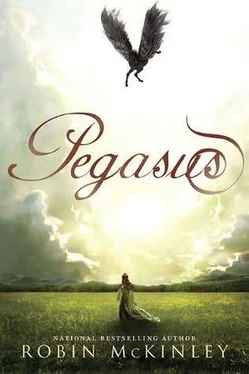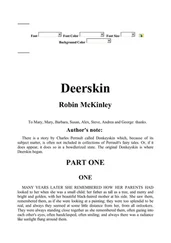But she did go.
And only she went—she and her father. They would not have even one minder, one attendant, one courtier—one guard. And her father was staying only one night, while she was given three weeks.
The reason for the lack of a grand procession was that they flew.
They flew.
Not as Sylvi and Ebon flew; she and the king were to sit or lie in something like hammocks. The king’s had eight ropes and Sylvi’s had six, and the ropes ended in great loops that hung round pegasi necks, and a spider-work of straps to hold the loops in place—plus a little crucial shamanic magic to make the system work. The pegasi had spent some time inventing them before they’d extended the official offer of transport.
Actually they didn’t have to invent anything, but they did have to find the old plans. I mean, we carry all kinds of stuff in draia—slings—hammocks—when we have to carry anything. You’ve seen us fly in or out with them, haven’t you? But we don’t carry humans. Gohrocoh said we didn’t need plans, that a drai was always a drai, and draia are not a problem, but Dad got all kingly and said that we weren’t in the habit of carrying humans in our draia and this was going to be a historical event, doodah doodah, and he wanted you to be comfortable as well as safe. Which also meant the shamans had to check out the ooffhaloah . . . the . . . the magic web that makes the whole show possible. Ropes and wings are not a best combination to begin with. And if we drop a load of apples or siragaa it’s not a big deal.
What old plans? said Sylvi.
Well, a long time ago I guess we thought about carrying you around—maybe about bringing you home. I’ve never heard that we ever did—
There aren’t any stories about it on our side, Sylvi put in. Even Ahathin hasn’t heard of any. Just a few stupid ballads that you know are made up.
Eah. But we still have the designs for the draia. Dad’s usually right about stuff but I was afraid it would be winter before they found the devil-blasted plans and then I suppose I’d’ve had to wait till your next birthday.
A pegasus delegation brought one of the human hammocks for inspection and approval. You’d think weaving was weaving, Sylvi had thought, the first time she’d seen a pegasus hammock—a drai —up close, when an envoy had come with chains of silk flowers and banners for some state occasion, shortly after she’d been bound to Ebon. Most things delivered to the human court were brought in the variety of small bags that usually hung round the pegasi’s necks or possibly in a larger bag slung between two pegasi, and they bowed or knelt and pulled a cord, and the bag collapsed, and whatever it was lay revealed or rolled out. It was, to the little Sylvi, only one more strange, unhuman thing the pegasi did, and she had never thought about it, till Ebon.
The next time she had the opportunity she touched—stroked—not only the flowers themselves but the sling the flowers had been carried in, and the lengths of gauzy fabric they’d been wrapped in. Pegasus fabrics remained rare and exotic in Balsinland. They used several plant fibres in their weaving as well as their paper-making, which produced glossy, drapey fabrics human weavers could not emulate; their silk was finer than any made by humans; they furthermore had perfected the use of whhayahaay, cobweb or spider-silk. Their silk was not merely finer but stronger than human-made; Sylvi discovered that a pegasi phrase for “well done” was “tight as silk.”
The human sovereign had several robes of pegasi weaving, and several human-adapted siragaa , and many who saw them would have been happy to buy similar for themselves; but there was no regular trade between the two peoples, and any attempt at discussion on this topic foundered on the pegasi’s blank incomprehension. The pegasi seemed to want nothing, and perhaps it was the empathy of the bindings that prevented any of the sovereign humans from demanding something the pegasi apparently did not wish to offer; and any bound human or family which had been so fortunate as to receive a gift of weaving from the pegasi treated it as an heirloom of their house.
You’d know, Sylvi thought, that there was something strange about this weaving even if you didn’t know anything about the pegasi. The fibres themselves were unfamiliar; the weaving was so delicate you couldn’t see how it fit together; and it had a curious shimmer—a shimmer you seemed to see with your fingertips as well as your eyes. The gauze was as soft as chick down; the sling was stiff and strong, and as sleek as Ebon’s shoulder.
The human draia were less glamorous, but they still shimmered in the golden afternoon sun as if with their own light. Sylvi knelt by hers; it had some kind of padding woven into it to make it comfortable for the passenger. It was like pressing your fingers into a thin, well-stuffed mattress: if you pressed hard enough you could feel the rope supports crisscrossing at the back. Sylvi would have been happy to leave at once—not least because it meant she would go.
She looked up from the mattress-hammock and caught her father’s eye. The drai was making it all real. She was going to go—senators or no senators, blood or no blood . . . Fthoom or no Fthoom, since everyone knew who was behind the delegation of magicians. “It’s perfect, ” she said firmly, as if in answer to any unspoken doubts. “I shall want to ride in it forever. ”
Her gaze shifted to her mother, who was looking worried with that old-general-measuring-up-inexperienced-troops gaze. Hirishy—the least likely soldier’s pegasus—was standing at the queen’s side. As Sylvi glanced at her, she cocked an ear, which usually meant yes, except when it meant no. And then she unfolded one wing just enough for her feather-hand to brush the queen’s cheek. The queen glanced down: Hirishy cocked the other ear and then the first again, a gesture that meant “Well?” or “There, there.” The queen’s face softened, and she stroked a quick, furtive hand down Hirishy’s cheek.
But the discussions among the humans about the princess’ journey still went on and on. After one particularly harrowing one, when Lord Bullen and Senator Gathshem, who had never agreed on anything before in their long lives at court, had been on their feet at the same time, positively shouting that the princess should not be allowed past the Wall, in the present unsettled state of the country, let alone be sent off— flown off—like a parcel or a diplomatic gift into the utter unknown, and the Holder of Concord had had to shout louder to regain control of the meeting, Sylvi said to her father, “They can’t stop me going, can they?”
When he didn’t answer at once she said in a voice a good deal higher and sharper than she meant, “ You won’t stop me going, will you?”
The king sighed. “No, my darling, I am determined you should go.”
After another pause she said in a very small voice: “Fthoom. . . .”
“Fthoom,” said her father grimly, “is one of the reasons you must go.”
There was a petition gathering signatures around the senate and the court—asking that Fthoom be reinstated to his old place in the king’s council. Sylvi only knew about it because of Lucretia: “I’m forbidden to tell you, and I don’t know what they’ll do if you let on it was me—cancel my appointment as your lady, I guess. And Glarfin will personally beat me to splinters. But I remember how much you minded that no one told you about your guards—and I’d’ve felt the same. I’d feel the same way now.” Lucretia looked at her, troubled, and tried to smile. “Us short women have to look out for each other.”
Читать дальше












